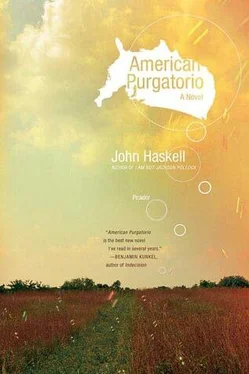John Haskell - American Purgatorio
Здесь есть возможность читать онлайн «John Haskell - American Purgatorio» весь текст электронной книги совершенно бесплатно (целиком полную версию без сокращений). В некоторых случаях можно слушать аудио, скачать через торрент в формате fb2 и присутствует краткое содержание. Год выпуска: 2006, Издательство: Picador, Жанр: Современная проза, на английском языке. Описание произведения, (предисловие) а так же отзывы посетителей доступны на портале библиотеки ЛибКат.
- Название:American Purgatorio
- Автор:
- Издательство:Picador
- Жанр:
- Год:2006
- ISBN:нет данных
- Рейтинг книги:3 / 5. Голосов: 1
-
Избранное:Добавить в избранное
- Отзывы:
-
Ваша оценка:
- 60
- 1
- 2
- 3
- 4
- 5
American Purgatorio: краткое содержание, описание и аннотация
Предлагаем к чтению аннотацию, описание, краткое содержание или предисловие (зависит от того, что написал сам автор книги «American Purgatorio»). Если вы не нашли необходимую информацию о книге — напишите в комментариях, мы постараемся отыскать её.
Los Angeles Times
American Purgatorio — читать онлайн бесплатно полную книгу (весь текст) целиком
Ниже представлен текст книги, разбитый по страницам. Система сохранения места последней прочитанной страницы, позволяет с удобством читать онлайн бесплатно книгу «American Purgatorio», без необходимости каждый раз заново искать на чём Вы остановились. Поставьте закладку, и сможете в любой момент перейти на страницу, на которой закончили чтение.
Интервал:
Закладка:
We see a girl in bikini and sandals, but she’s not the right girl. Polino has very defined criteria for the person he’s willing to share his beer with and so we stroll around, past people in restaurants watching waves, past surfer-themed bars, and motels with lawns like putting greens.
And then we find her. She’s not blond, but that’s okay. She’s sitting on the public grass in cut-off jeans, braiding her hair, and when we sit with her she doesn’t walk away. A conversation is started and we learn she’s from out of town. She’s got long black hair and Polino offers her his beer. I can see that all my motivational talk was nothing compared to a real living person, wearing a shirt several sizes too small, looking at Polino and listening to him, and seeming to be interested. Gradually I extricate myself, leaving Polino alone with the girl, talking and braiding and feeling the worm of desire.
I go back to Linda’s house.
I stand across the street in the shelter of the same weeping willow, and from the protection of this vantage I start my vigil. Her car is still parked on the street so I wait. After about an hour and a half, when she finally does walk out of the front door, I’m not sure what I’m going to say. I’ve rehearsed it a thousand times but now when I’m confronted with the real object, slightly different and less malleable than the fantasy object, I begin to waver.
Linda walks to the driver’s side of the maroon station wagon, takes her keys out of her pants — sweatpants that conform to the contour of her legs — and that’s when desire, the enemy of sloth, sets me in motion. I start running. I’ve waited so long that now, before she gets in the car and drives away, I have to run to her. She looks up, sees this man running toward her, but she isn’t scared. By the time I get to her and stop in front of her, I’m breathing more than I would like.
“Remember me?” I say.
Of course she does.
“I’ve moved to San Diego.”
“That’s a coincidence,” she says.
She’s wearing a T-shirt.
“Are you a surfer?” she says.
“A body surfer?”
“You’ve got a tan like a surfer.”
“From the sun,” I say. “How are you? Are you off to work?”
“To a class,” she says.
“A class in what? What subject?”
She just looks at me. Although the question never gets officially answered we find ourselves talking about the Scripps aquarium and Torrey Pines park and how the actual Torrey pine tree is structurally more like a fir than a pine tree. Our conversation bounces around but she seems to enjoy my somewhat overzealous attention. We talk for a while, standing at the side of her car, and then she says, “Would you like to get together, later?”
I nod, tell her that I would, and so we arrange to meet. The idea of a picnic is mentioned. I watch her get into the station wagon and drive off, and as I walk away, I’m feeling as close to happiness as I can remember feeling in a long time.
7
That afternoon, back at the boardwalk, I find Polino, shirtless, sitting against the boardwalk wall, looking out toward the ocean and the clouds above the ocean, holding in his hand a brown paper bag with a beer inside. He doesn’t offer me any when I sit beside him, and I can see that, although I’m happy, Polino is not so happy. It turns out that the girl on the grass had no interest in him, that he got his hopes up for nothing, that he’d promised himself he would never get his hopes up because bad things always happen and now he did and they did and he’s pissed off. At me. “You set me up, man.”
I can see, or think I can see, behind the anger, to Polino’s sadness. And I sympathize. I feel a fondness for this person, but when I ask what happened, all he wants to tell me is that he fell on his face. “I fell, man. I forgot what it feels like but now I remember. The oldest rule in the book.”
I don’t ask him which book he’s referring to, and he goes on about what an asshole he is and how stupid he is, and I mention something Shakespearean about assuming a trait if you lack it.
“Fuck that,” he says.
“It’s from Shakespeare,” I say.
“I know what it is, fuckhead.” And then he launches into a disputation on the nonexistence of Shakespeare. “He’s a fake, man. He didn’t exist.”
“As a writer, you mean?”
“Believe any half-assed bullshit you want, man, if it floats your fucking canoe.”
“Are you saying he’s dead?” I ask, and we don’t exactly argue about Shakespeare because I don’t know the whole history of Shakespearean scholarship on the subject, but I think Shakespeare probably existed. And even if he didn’t, I would like to believe, and find it useful to believe, that he did.
But Polino’s not going along with that. “I don’t believe in anything,” he says, “unless it’s in front of my face.” He pulls out a cigarette from behind his ear, tears off the filter, and with it, gestures across the beach. “I believe this. This is my life,” he says, “and I like it.”
That’s what he says, but really I think he dreams of a different life. And the problem is desire. He wishes that something would change, but he’s made a calculation, at some level, that it’s easier to deny his desires than to have them. He knows desire won’t ever get him anything but more desire and so he’s short-circuited the chain of desire, thinking that now he doesn’t have it, that he’s free and unencumbered, and he makes a case for his own happiness because of that supposed freedom.
But like the sea behind a seawall, the desire is still there. His finger in the dike has gotten used to holding it back — it’s a habit — and so it doesn’t seem unusual. He’s convinced himself that he wants nothing and needs nothing, and to keep this myth alive he won’t allow himself to feel the dissatisfaction pounding against the wall in front of him. He believes in the myth of the carefree life of no desire, which, although it’s called carefree, actually takes a lot of work.
He drops his cigarette into the beer can, throws it toward a trash bin, and it lands, because of the wind, in the sand. This little four-second movie, as I replay it to myself, brings up a memory of Anne — I think it was Anne — dropping a beer can into a stream in the Catskill Mountains.
We were walking along a rocky streambed near a friend’s house. Other people were with us and we were all drinking beer, and when she finished her beer, instead of holding on to it, she looked for a place to leave her can where it wouldn’t be so obvious. She knew that what she was doing was wrong, and the fact that she knew it made it worse. At the time I tried to love her and overlook this — not indiscretion, but this thoughtless and ugly act. Although she wasn’t ugly, it made her seem ugly, and I begin to remember that she wasn’t completely beautiful, not unadorned beauty, and that my love for her had lapses. For a long time I was able to overlook those lapses, and was happy overlooking them.
Now I say something to Polino about leaving trash on the beach, and Polino tells me he’s tired of my goddamn goody-goodness. “Don’t walk around here if you don’t like it,” he says. “Walk someplace else.”
Being the conciliator, I say something like “Yeah” or “Whatever.”
But Polino has renounced, not only his desires, but me, who, strangely enough, represents desire, and when he tells me to leave, to fuck off and get out, what he’s really saying is, Don’t destroy my world.
So fine, I think, and I tell Polino that I’ll see him later.
He says, “You don’t get it, Van Belle. I don’t want to see you later. I want to see you never. Go to a different beach. Find some other beach to do your … This is my beach.”
Читать дальшеИнтервал:
Закладка:
Похожие книги на «American Purgatorio»
Представляем Вашему вниманию похожие книги на «American Purgatorio» списком для выбора. Мы отобрали схожую по названию и смыслу литературу в надежде предоставить читателям больше вариантов отыскать новые, интересные, ещё непрочитанные произведения.
Обсуждение, отзывы о книге «American Purgatorio» и просто собственные мнения читателей. Оставьте ваши комментарии, напишите, что Вы думаете о произведении, его смысле или главных героях. Укажите что конкретно понравилось, а что нет, и почему Вы так считаете.











